- Home
- Tim Greaton
Under-Heaven Page 6
Under-Heaven Read online
Page 6
I nodded again and was immediately dismissed as one of the Coastguard officers waved to the sheriff.
“We’ll need you to confirm that is the man who shot you, Mr. Thompson,” the sheriff said.
My father nodded weakly. The sheriff helped him to his feet and supported him as they trudged further along the pier to stand beside the Coastguard boat.
As one, the crowd surged after them, carrying me along toward the unfolding scene. Mostly lobstermen, these men smelled of fish, brine and gasoline. I knew my father had asked me to go home, but I wanted to gather a few more details so I could explain everything to my mother. My eyes kept going to my father’s arm, which hung as limp as a mooring rope. Blood had completely soaked through the tee shirt and now fell in thick, red drips that splattered onto the pier. How could I leave without being able to tell my mother he was okay?
To say I was terrified would have been an understatement. The crowd comprised the largest group of adults I’d ever imagined, forget seen, and I had personally never been this close to a sheriff. I wished my dog had been at my side, but I knew he would be waiting at the back of the crowd for me to emerge.
As my father and the sheriff approached their boat, the two Coastguard officers lifted a large, sheet-covered object and placed it along the wide rail of their boat. I gasped, realizing the shrouded object was the approximate shape and size of a man. The series of red splotches blooming across the white material said the rest.
I held my breath.
One of the Coastguardsmen motioned to my father and lifted the sheet. My father looked down, nodded and mouthed the words, “That’s him.”
I was thankful I couldn’t see the face from my vantage.
It was bad enough I had seen the sheet. One Coastguardsman lifted a rifle and handed it to the sheriff. The sheriff examined it then handed it back before making a few notes. The conversation between the four men went on for another few minutes.
By this time, I had begun to hear some of the things the crowd was saying. There were several statements about how flatlanders should go back to where they belonged. I also heard my father’s name mentioned along with numerous swear words. Either these fishermen didn’t realize who I was, or they just didn’t care. But of all the snippets of angry conversation, two sentences reverberated in my mind like hammers against a bell: “The flatlander killed Stretch McGraw…The flatlander shot him dead.”
Stretch McGraw, I knew, was the man who had fired a gun at my father the first time. I figured he must have tried again. My father stored a rifle below deck and, judging from the deer he brought home every fall, he was a good shot. Though I didn’t know anything about the law, the whole thing terrified me. What if my father couldn’t prove the other lobsterman had shot at him first? What if the sheriff tried to say it was murder?
“That’s his boy,” I heard someone say from behind me. Suddenly, the crowd quieted. They still talked among themselves, but it was more of a whisper.
The gathering at the Coastguard boat only went on for another few minutes before a car horn began to blare from the top of the hill.
“Brrrrr, brrrrrr...brrrrr, brrrr.”
I glanced up to find the entire street packed. From the top of the hill to the bottom, there wasn’t a bare stretch of pavement. There might have been a thousand gawkers in all. I would not have thought we had that many people in the entire county, forget the little town of Coldwell. Slowly, the throng parted and gave way to a black sedan that, judging from the shine on the paint, looked to be fairly new, certainly newer than my father’s rust and red 1928 Ford pickup truck. Reluctantly, the crowd parted and let the black car glide down toward the docks until the press of bodies on the dock hid it from my view.
“Mr. Thompson, the medical examiner is here,” I heard the sheriff say. “Why don’t we see what he can do about that arm of yours?”
“I need to unload my catch,” my father answered. His voice was weaker than I’d ever heard it, but there was conviction in his tone.
“Mr. Thompson,” the sheriff said, “you’re in no condition for that. Besides, you’re under arrest.”
“Sheriff, you know Stretch fired at me three times in the last month. How can you think it was anything but self-defense?”
“I’m sorry,” the sheriff said. “I know what you reported, but none of that matters for the moment. After the doctor treats you, I’ll have to take you back to my office. As far as the law is concerned, I have to arrest you.”
My father’s head sagged.
“I can’t afford to lose my catch, Sheriff. Please?”
“Mr. Thompson, even if I could let you unload your boat, which I can’t, you’re in no condition to carry anything.”
My father looked up, but even that seemed to be a challenge for him.
“I can do it, Sheriff. I have to. I only pulled in a crate and a half before Stretch started shooting, but every penny matters. I have a family. If I leave my lobsters here, they’ll die or be stolen.”
Suddenly, someone gripped me painfully by the ribs from behind and shoved me to the side. I snapped around to look but couldn’t tell which one of the scruffy fishermen had done it. At that moment, the doctor was making his way through the jam-packed group of men. He was a tall, slender man with dark-rimmed spectacles and hair that was graying at the edges of his high forehead. His eyes were so intent on my father and Stretch’s bloodstained sheet ahead that he never seemed to notice any of us as he pushed through the narrow aisle that had been made for him.
The doctor glanced quickly as one Coastguardsman peeled the sheet away from Stretch McGraw. From my new position, I could now see the unshaven face of the dead man. His cheeks were hollow and weathered, and his thinning hair was streaked with gray. He looked older than my father, but I couldn’t say how much. The way he lay there with his eyes closed, it was almost like he was just sleeping.
The doctor reached out and held two fingers to Stretch’s neck.
“He’s definitely gone,” he said.
The coastguardsman nodded.
“We figured, sir.”
“Then, I’ll get to him in a minute.” The doctor sat his bag down and knelt beside my father’s wounded arm. “I’m Doctor Gregory,” he said to my father. “Would it be all right if I took this off?” He pointed toward the blood-drenched rag on his arm.
“I have to unload my catch first,” my father croaked.
It didn’t take a doctor to see my father’s pale and haggard condition was growing worse by the second. He hardly seemed able to remain standing, never mind being able to haul lobsters off the Miss Kane’s deck.
I was ready to try doing it myself when the doctor stood and whispered something to the sheriff.
The sheriff nodded.
“Who runs the shanty?” he asked loudly. He was referring to the wholesaler who bought the catch from the fishermen that worked this pier.
It took a bit of jostling, but finally a fat man with unkempt, blond hair moved to the forefront of the crowd.
“That’s me, Sheriff,” he said, “but I didn’t see nothing.”
“I figured that,” the sheriff told him. “What’s your name?”
“Kevin Brett, sir. Most of the fellers just call me K.B.”
The sheriff pointed toward my father. “Well, K.B., this man’s in a bad way, and I need you to check his boat and buy his catch. I assume you can get a couple of those strapping salts there to help you unload it.”
Mr. Brett shook his thick head, causing all three of his chins to jiggle.
“I’m sorry, Sheriff, but I’ve known Stretch damned near my whole life. I’m all done buying anything from that flatlander!” He emphasized the last word like a curse.
The sheriff’s face tightened and his eyes narrowed near to closed. He jabbed a finger at the fish wholesaler.
“I hope you’re listening to me, Mr. Brett, because I’ve got too many issues to handle here today already, and I’d hate like hell to add the arrest of a lobster broker
to my list. I expect you to unload the lobsters from Mr. Thompson’s boat and to pay him whatever rate is fair today. Is that clear?”
Mr. Brett’s eyes grew wide and his thick lower lip quivered when he spoke again.
“You can’t make me buy his catch.” But, by the soft tone of the big man’s voice, he didn’t believe his own words.
The sheriff turned to look at the two Coastguardsmen who were standing beside Stretch McGraw’s sheet-covered body. The taller of the two men nodded and tipped his white hat to the sheriff.
I didn’t know what kind of a code they shared, but when the sheriff spun back to Mr. Brett, he said, “It appears that these two gentlemen might need to inspect every boat that comes and goes from this wharf—because of all the recent violence, you understand.” The sheriff stared out into the faces of the fisherman that now crowded the wharf. “I imagine a lot of these men will get sick of being boarded once or twice a day, and they might start doing business with shanties over in Wiscasset or maybe in Brunswick. I don’t imagine that would be too good for your business, would it, K.B.?”
Mr. Brett looked to either side at the faces of his customers. Most of the men looked away before the big man could catch their gaze. Finally, he refocused on the sheriff for just a moment before his eyes fell to the weathered planks of the wharf.
“It might be best, Sheriff,” the fat man said, “if I take Ben’s whole catch and pay a fair price for it. Just like you said.”
Voices grumbled from all over the crowd. I didn’t know if they were upset because the wholesaler gave in so easily, or if it was simply because the sheriff had stood up for my father. I suspect it might have been a little of both.
My father must have been holding himself up by force of will alone, because as soon as Mr. Brett agreed to take the lobsters, he sat down heavily onto the boards of the pier. It took the doctor several minutes to gently remove the bloody shirt and to clean the wound in his biceps with the water from a canteen the shorter Coastguardsman supplied.
“The good news,” the doctor said, “is that the bullet passed right through—Ben, is it?”
My father nodded but didn’t seem to have the energy to speak.
“The bad news,” the doctor said, as he began to wind a white bandage around his arm, “is that this arm is going to hurt something fierce for the next month or—”
I was unable to hear any more of the doctor’s comments because the grumbling of the fishermen had gotten louder and angrier. I heard the word “flatlanders” from a dozen mouths, and two or three times I heard the phrase, “Downeast Justice.” I knew enough about the local fishing culture to know that life in Coldwell would not be getting easier anytime soon.
The sheriff let the grumbling go on for only a few seconds before he interjected, “If I hear you men say the word ‘flatlander’ one more time, I will personally drag you to the nearest jail. For those of you who don’t know—” His voice grew louder. “—I’m from Massachusetts. Yes, a flatlander. Do any of you have an issue with that?”
There was a deathly silence.
After finishing with my father, the doctor pulled the sheet back from Stretch McGraw’s corpse. He checked the dead man’s glazed eyes, tapped his arm twice and lifted a stiff limb before letting it drop again. Then he opened his shirt to examine the two bullet wounds that my father’s rifle had created. It was morbid, I knew, but I couldn’t stop myself from watching. Finished, the doctor drew the sheet back over Stretch’s face then, with the sheriff’s help, helped my father back toward the street.
“Tell your mother what I said,” he whispered as they all but carried him past me through the subdued crowd.
I followed close enough behind to see the two men help him into the back seat of the cruiser. Then, the sheriff got into his car, which still had blue lights flashing, and turned on his siren. He inched through the crowd and up the hill. The doctor’s black sedan followed. I watched them both disappear over the last rise.
Distance and terrain had silenced the siren by the time I extricated myself from the mob of fishermen and onlookers. When I reached halfway up the paved hill, Whiskey magically appeared beside me. I pulled him to the side of the road as a black hearse slid down the hill to collect the body of Stretch McGraw.
I shuddered as it passed.
By then the terror of the last hour’s events had begun to take their toll. I felt as though I’d been knocked down and pressed by a large rolling pin. Whiskey whimpered as I wiped at my tears. I rubbed behind his ears, and together we made our way home.
8
Difficult Promises
Jesse knew he was too old to be riding in a grocery cart, but he’d been doing it for as long as he could remember and couldn’t imagine a more fun way to shop for food. For the last few months, however, he had accepted that his big boy legs just wouldn’t fit through the holes in the baby seat anymore, so he now rode right inside the cart with all the food. He smiled as his mother pushed past the service desk, but not the woman with the bright red lipstick handed him two lollipops like she always did. The truth was that Jesse didn’t really like lollipops anymore (the kids at school always teased him when his lips and tongue turned colors) but it was still fun to reach out and grab the candy-topped sticks as they passed by.
“You look very handsome today,” the woman said to him as they rolled further into the store.
“So do you,” Jesse called back just like he had the last two times. Once again, the woman and his mother both laughed.
Of course, Jesse knew you weren’t supposed to call women “handsome.” That was a term reserved for boys. But he still said it because he especially liked to see his mother laugh. She didn’t do that nearly as much as she used to.
“How about some Kool-Aid?” his mother asked.
“Grape Soda,” Jesse announced.
“Not this week, babe,” his mother said. “We’re living on one income now.”
Jesse made a face and stuffed his lollipops into his pocket. He had a pretty good collection with all different colors in his top drawer and planned to offer them to his father the next time they got together. Lately, he didn’t think his father had been eating enough.
They rolled quickly down the first two aisles, and Jesse was discouraged to see the picture of plain flakes on a big ugly bag of cereal she picked. He also didn’t approve of the boring loaf of white bread, but he kept silent because his heart was set on a cream-filled donut. Last week they hadn’t had enough money, but Jesse planned to not ask for any extra things so that he could choose a donut for each of them.
They continued shopping and were just turning out of the peanut butter and jelly aisle when a shopping cart burst out of nowhere and cut them off. His mother pulled Jesse to a stop just in time. As it was, he could have reached into the other cart and grabbed some food if it hadn’t been empty.
“You’re looking seriously good, sweet thang!” said the man behind the cart. He was dressed in blue jeans and a white tee shirt that had a few stains and several large holes. His chest hair was a lot thicker than Jesse’s dad’s.
“Coming from a man who’s been married four times, that’s quite a compliment, Doyle,” Jesse’s mom said. “Now could you move your cart?”
“I hear you sent your old man packing. It’s about time.”
“I don’t suppose you see my son sitting right there in front of you?”
“S’okay. I like kids.”
“I bet you do, Doyle,” Jesse’s mother said, “just as long as they don’t get in the way of a good night knocking headboards.”
“You’re tough, Karen, but I figure it’s time you hooked up with someone that’s not a loser.”
Jesse was mad and scared at the same time, but his dad had told him that sometimes you had to do things that scared you. He stood up in the cart and felt several cans roll under his feet.
“Stop talking bad about my dad,” Jesse said. “It ain’t nice.”
“Take it easy, little guy. I was just try
ing to get your mom to go out on a date with me. Then you and me, we could be friends.” His face split into a lopsided grin, revealing two chipped teeth. “Wouldn’t it be great if I could come over and we could…color together sometimes?”
“Doyle,” Jesse’s mom said, “the only thing that makes me madder than catching you stalking me around the grocery store with an empty cart, is hearing you talk to my kid. You and I won’t ever be going on a date, and you definitely won’t ever make friends with my son.”
Jesse gave the man his best “so there” stare and sat back down. Unfortunately, he didn’t notice the loaf of bread under his butt until half of it was squished. He pulled it out and kept the squished part hidden near his leg.
Doyle shoved his cart to the other side of the aisle where it slammed into the shelves and sent a half dozen cans rolling across the floor.
“You’re really screwing up, Karen,” the man said, “’cause you ain’t likely to find too many good men like me.”
Jesse’s mom harrumphed and pushed their cart rapidly away and didn’t slow until they reached the hamburger coolers. He didn’t like hamburger so was happy when she moved a little further down and grabbed one package each of hotdogs and bologna slices.
“So what did Wagner have that I don’t?” Doyle said, suddenly coming up from behind them.
“I swear I’m going to call the store manager,” Jesse’s mom snapped. She threw the meat into the grocery cart and shoved their cart forward. Jesse rocked backwards and wondered felt the bread press against his leg. He wondered if any of their food was going to survive.
“Seriously, Karen. Just tell me why you’re too good for me.”
Their cart jerked to a stop again, but this time Jesse was prepared with his fingers firmly holding onto the edge. Stiff with anger, his mother turned to face Doyle but not before she reached down to grab a can of green beans out of the cart.

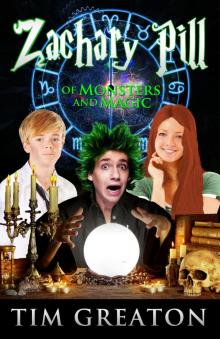 Zachary Pill, Of Monsters and Magic
Zachary Pill, Of Monsters and Magic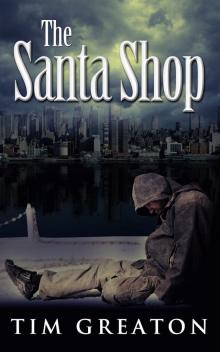 The Santa Shop
The Santa Shop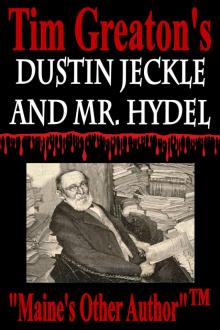 Dustin Jeckle & Mr. Hydel
Dustin Jeckle & Mr. Hydel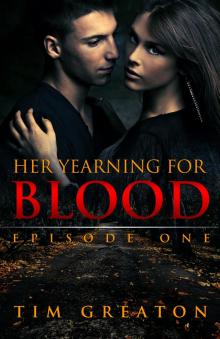 Her Yearning for Blood: Episode One
Her Yearning for Blood: Episode One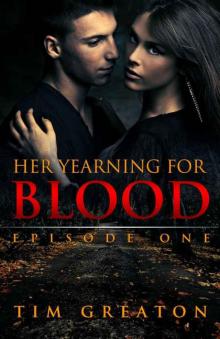 Her Yearning for Blood
Her Yearning for Blood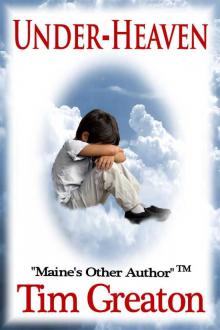 Under-Heaven
Under-Heaven